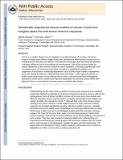Genetically engineered mouse models of cancer reveal new insights about the antitumor immune response
Author(s)
DuPage, Michel J.; Jacks, Tyler E.
DownloadJacks PMC Genetically engineered (same as other).pdf (1.006Mb)
PUBLISHER_CC
Publisher with Creative Commons License
Creative Commons Attribution
Terms of use
Metadata
Show full item recordAbstract
Cancer is a complex disease that can originate in virtually all the tissues of the body, and tumors progress through many different stages during their development. While genetic mutations in the emerging cancer cells drive this disease, it has become increasingly clear that cancer development is strongly influenced by the surrounding microenvironment. Cells of the immune system are critical components of this extrinsic network of cancer regulators, contributing significantly to the microenvironment of most cancers and either promoting or inhibiting the initiation and progression of this disease. Genetically engineered mouse (GEM) mouse models of spontaneous cancer are starting to shape our understanding of how antitumor T cells may act to prevent or inhibit cancer progression in some settings and not others. Lessons learned from investigating spontaneous mouse cancer models have important implications for directing clinical efforts that attempt to direct a cancer patient's immune system to eradicate their disease.
Date issued
2013-04Department
Massachusetts Institute of Technology. Department of Biology; Koch Institute for Integrative Cancer Research at MITJournal
Current Opinion in Immunology
Publisher
Elsevier
Citation
DuPage, Michel, and Tyler Jacks. “Genetically Engineered Mouse Models of Cancer Reveal New Insights About the Antitumor Immune Response.” Current Opinion in Immunology 25, 2 (April 2013): 192–199
Version: Author's final manuscript
ISSN
09527915